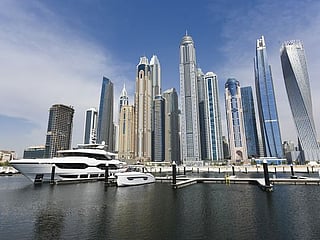More than 2,000 members sign up for UAE-Israel business portal in less than 45 days
Changes will need to be made on visas, financial pacts and tax treaty

Dubai: A newly created online platform to initiate possible contacts between UAE and Israeli businesses has already drawn in more than 2,000 members. If the initial inquiries were mostly from Israeli investors, these days the majority are from the UAE.
“Emiratis are looking to see how they can penetrate the Israeli market, whether it's for investment opportunities, procuring goods and services and technology, [or] investment in infrastructure development,” said Dorian Barak, co-founder of UAE-Israel Business Council.
It’s not just Emiratis who want to get into the space and do their bit in opening up a brand new market for them. Barak was recently approached by a large Indian building materials company, with operations in the Middle East, looking to expand into Israel by partnering a local firm.
Reach out
Barak was accompanied by Fleur Hassan-Nahoum, East Jerusalem’s Deputy Mayor. She is planning a series of delegations by Jerusalem-based entrepreneurs, fund managers, tech industry insiders, and tourism industry executives to the UAE.
“My own interest is to promote my city in tourism and infrastructural development,” said Hassan-Nahoum.
A new investor category
Israeli investors could connect with UAE’s real estate as well, and if that happens, it could bring some much needed relief to local developers who have passed through two difficult years.
Israeli investors are very real estate biased - so it's definitely going to attract interest,” said Barak. “I also think you're going to see a lot of Israelis looking to do things in logistics and building materials, basically taking Israeli businesses and transplanting them here. Expanding them because there's so much more you can get from the UAE by servicing the East.”
In the past decade, Israel has boosted its trade with China, India and the rest of South Asia. This also includes Indonesia, Malaysia, and Pakistan where Israelis have run businesses through intermediaries and overseas affiliates.
These markets will be a “huge focus”, said Barak, adding that UAE is “one of the better places” to serve Asia-focused businesses.
Work that needs doing
Since the signing of the accord, companies from the UAE and Israel have signed deals in infrastructure, banking services, investments and even in diamond trading. But a lot more needs to be done.
The countries will initially need to focus on three major areas. First is a mutually acceptable visa regime change, allowing Israelis to come to the UAE with an Israeli passport. The second area that needs to be prioritized is a tax treaty, followed by the development of financial infrastructure in UAE that enables Israeli companies to operate in the Arab country.
But the pandemic is really slowing down the pace at which things are happening. “It's like we're operating with one hand tied behind our back,” said Barak. “COVID-19 has really put a damper on these things - even travel becomes very challenging for government officials.”
This situation is causing business and investment-related talks to progress at a much slower rate than what anyone wants. But one factor remains a constant - Israeli businesses will continue to build their presence in UAE.
Sign up for the Daily Briefing
Get the latest news and updates straight to your inbox







